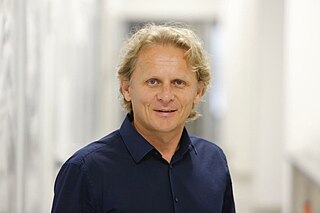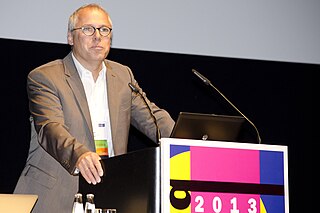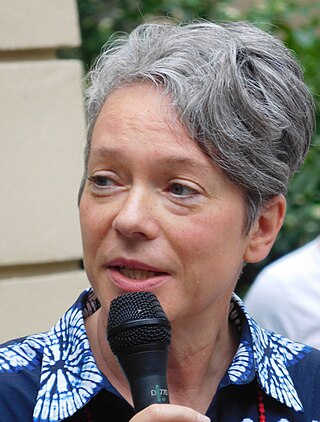Related Research Articles

Christiane (Janni) Nüsslein-Volhard is a German developmental biologist and a 1995 Nobel Prize in Physiology or Medicine laureate. She is the only woman from Germany to have received a Nobel Prize in the sciences.

Goethe University Frankfurt is a public research university located in Frankfurt am Main, Germany. It was founded in 1914 as a citizens' university, which means it was founded and funded by the wealthy and active liberal citizenry of Frankfurt. The original name in German was Universität Frankfurt am Main. In 1932, the university's name was extended in honour of one of the most famous native sons of Frankfurt, the poet, philosopher and writer/dramatist Johann Wolfgang von Goethe. The university currently has around 48,000 students, distributed across four major campuses within the city.

Hartmut Michel is a German biochemist, who received the 1988 Nobel Prize in Chemistry for determination of the first crystal structure of an integral membrane protein, a membrane-bound complex of proteins and co-factors that is essential to photosynthesis.

The Gottfried Wilhelm Leibniz Prize, or Leibniz Prize, is awarded by the German Research Foundation to "exceptional scientists and academics for their outstanding achievements in the field of research". Since 1986, up to ten prizes have been awarded annually to individuals or research groups working at a research institution in Germany or at a German research institution abroad. It is considered the most important research award in Germany.

Klaus Rajewsky is a German immunologist, renowned for his work on B cells.

Eugene Wimberly "Gene" Myers, Jr. is an American computer scientist and bioinformatician, who is best known for contributing to the early development of the NCBI's BLAST tool for sequence analysis.

Søren Brunak is a Danish biological and physical scientist working in bioinformatics, systems biology, and medical informatics. He is a professor of Disease Systems Biology at the University of Copenhagen and professor of bioinformatics at the Technical University of Denmark. As Research Director at the Novo Nordisk Foundation Center for Protein Research at the University of Copenhagen Medical School, he leads a research effort where molecular-level systems biology data are combined with phenotypic data from the healthcare sector, such as electronic patient records, registry information, and biobank questionnaires. A major aim is to understand the network biology basis for time-ordered comorbidities and discriminate between treatment-related disease correlations and other comorbidities in disease trajectories. Søren Brunak also holds a position as a Medical Informatics Officer at Rigshospitalet, the Capital Region of Denmark.
Franz-Ulrich Hartl is a German biochemist and the current Executive Director of the Max Planck Institute of Biochemistry. He is known for his pioneering work in chaperone-mediated protein folding.

Bernhard Hassenstein was a German biologist and psychobiologist.

Ivan Đikić is a Croatian-German molecular biologist who is the Director of the Institute of Biochemistry II at Goethe University Frankfurt.

Bonnie Anne Berger is an American mathematician and computer scientist, who works as the Simons professor of mathematics and professor of electrical engineering and computer science at the Massachusetts Institute of Technology. She is the head of the Computation and Biology group at MIT's Computer Science and Artificial Intelligence Laboratory. Her research interests are in algorithms, bioinformatics and computational molecular biology.

Birgitta Wolff is a German economist and politician of the Christian Democratic Union (CDU). She served as minister of education and culture and as minister of research and economy in the state government of Saxony-Anhalt from 2010 to 2013, and as president of the Goethe University Frankfurt from 2015 to 2020.

Detlev Ganten is a specialist in pharmacology and molecular medicine and is one of the leading scientists in the field of hypertension. He founded the World Health Summit in 2009. He was Chairman of the Foundation Board of the Charité Foundation (2005–2015), editor of the Journal of Molecular Medicine, Chairman of the Board of Trustees of the Max Planck Institute of Colloids and Interfaces and Max Planck Institute of Molecular Plant Physiology as well as Chairman of the Board of Trustees of the Ethnological Museum Dahlem of the Prussian Cultural Heritage Foundation.

Martin Vingron is an Austrian mathematician working in the fields of bioinformatics and computational biology. Since 2000, he has been Director of the Max Planck Institute for Molecular Genetics.
Amparo Acker-Palmer is a German-based Spanish cell biologist and neuroscientist. Her research focuses on the similarities of the mechanism of nerve and blood vessel development. She has worked alongside her husband, Till Acker, who is a neurobiologist, in researching tumor therapies. In her career, she has won several awards, including the Paul Ehrlich & Ludwig Darmstaeder Prize for Young Researchers in 2010. In 2012, Amparo Acker-Palmer was elected as member of the German Academy of Sciences Leopoldina.
Arndt von Haeseler is a German bioinformatician and evolutionary biologist. He is the scientific director of the Max F. Perutz Laboratories at the Vienna Biocenter and a professor of bioinformatics at the University of Vienna and the Medical University of Vienna.

Ina Hartwig is a German writer, literature critic and academic lecturer. From July 2016, she has been Kulturdezernentin in Frankfurt, the city councillor responsible for culture and science.

Manuela Rottmann is a German lawyer and politician of the Alliance 90/The Greens who has been serving as the party's deputy chair since 2024. She previously was a member of the Bundestag from the state of Bavaria from 2017 to 2024.
Deborah Düring is a German Alliance 90/The Greens politician who has been a member of the Bundestag for the state of Hesse since the 2021 German federal election.
Juri Rappsilber is a German chemist in the area of mass spectrometry and proteomics.
References
- ↑ "People", Molecular Bioinformatics, Goethe University Frankfurt, retrieved 2021-11-12
- 1 2 "Ina Koch" (PDF), Researcher portraits (in German), Cluster of Excellence Frankfurt Macromolecular Complexes , retrieved 2021-11-12